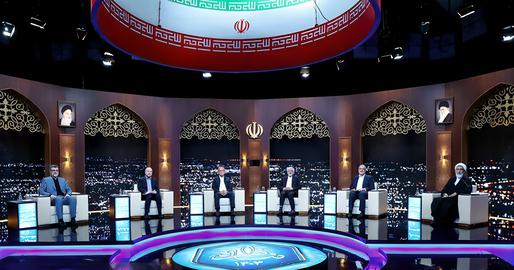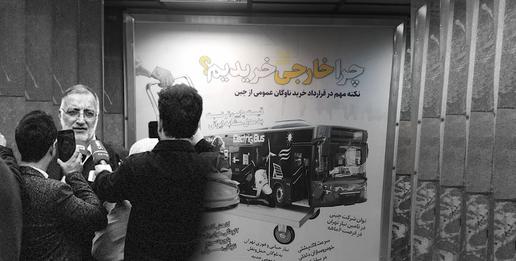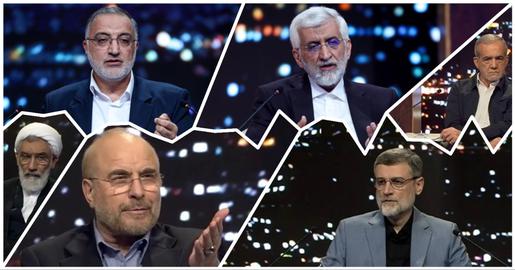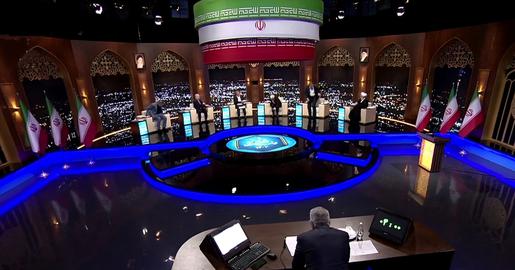Candidates in Iran's presidential elections are striving to increase voter turnout by appealing to Iranians who have become disillusioned with the political system.
They are making various promises to bring these disheartened citizens back to the polls.
Since the 1979 revolution, women's issues have been a persistent topic of discussion, with many voicing their demands through street protests and campaigns. However, since 2022, concerns related to women, particularly the hijab, have gained even more prominence.
Are the presidential candidates addressing these concerns, and if elected, will they have the power to change policies or laws regarding the hijab? What do the candidates say about the hijab?
Saeed Jalili
On April 30, presidential candidate Saeed Jalili emphasized the hijab as a societal advantage that must be defended vigorously.
He said that there should be no hesitation in enforcing the law and stressed "the importance of upholding the truth."
Jalili believes that "women's dress is integral to their safe and calm presence in society."
Amirhossein Ghazizadeh Hashemi
Amirhossein Ghazizadeh Hashemi shares a similar view, describing "women as an opportunity rather than an issue."
He emphasizes the role women have historically played in traditional society and the family economy.
Hashemi asserts that women "should be recognized for their capabilities, not their appearance," and supports the enforcement of the hijab law to highlight these "capabilities."
Mostafa Pourmohammadi
Former interior minister and presidential candidate Pourmohammadi also stresses "the importance of law compliance."
He believes that "women's issues should not be limited to clothing" but insists "on the necessity of proper morals and human relations."
Pourmohammadi advocates for "everyone to follow societal rules to maintain a good society."
Alireza Zakani
Alireza Zakani is a strong proponent of the hijab, even featuring his support on public banners in Tehran.
He said that the municipality "has a legal, moral, and religious duty to protect the environment from immorality and the lack of hijab."
Zakani supports police plans for enforcing hijab regulations and is ready to "cooperate fully."
He considers the hijab "a legal and Sharia obligation," promising a detailed, step-by-step enforcement plan.
Mohammad Bagher Ghalibaf
Speaker of the parliament Mohammad Bagher Ghalibaf regards hijab laws as "significant achievements" from his time in parliament.
He highlights numerous approvals by the Supreme Council of the Cultural Revolution for hijab, chastity, and culture, including over 70 articles.
Ghalibaf has pushed for the swift finalization of the chastity and hijab bill and insists on firm action against those opposing the hijab.
Masoud Pezeshkian
Among the current presidential candidates, Masoud Pezeshkian is the only one expected to change the status of the hijab.
Reformists emphasize in their publications that "Pezeshkian believes in the role of women."
They argue that with the presence of Pezeshkian, the presence of the Morality Police will diminish significantly.
Regarding the "Noor Plan," Pezeshkian stated on Friday: "People's intervention in the name of the Noor Plan is leading us to darkness."
They added, "Our girls don't have a problem with our beliefs, but when we impose them, it turns them against us and makes them anti-religious."
A new enforcement of severe measures began on April 13, just hours before Iran launched hundreds of suicide drones and missiles at Israel.
Across Iran, there have been numerous reports of women being arrested and subjected to the use of force due to perceived violations of mandatory dress codes.
Users across social networks are participating in a spontaneous campaign using the hashtag "war against women" to document their experiences and observations regarding the government's crackdown on the opponents of mandatory hijab.
Reports have surfaced detailing the use of repressive tactics, particularly on female students in various universities.
Pezeshkian, a reformist candidate, asserts: "A girl who doesn't wear a headscarf isn't a problem as long as we don't intervene, but this intervention causes social conflict."
In the Islamic Republic of Iran, the enforcement and oversight of hijab laws are managed by numerous institutions and organizations.
While the exact number of these entities is unknown, the commander of the police has identified at least 32 institutions involved in enforcing hijab.
Many of these institutions operate directly or indirectly under the president's supervision.
The Supreme Council of the Cultural Revolution, chaired by the president, plays a crucial role in shaping cultural policies, including those related to hijab.
The Ministry of Interior, responsible for overseeing and coordinating the various institutions charged with enforcing hijab laws, also falls under the president's jurisdiction.
However, the Supreme Council of the Cultural Revolution ultimately operates under the direct supervision of the Supreme Leader of Iran.
Ali Khamenei appoints the council members, including influential figures like Amir Hossein Bankipour, who played a significant role in drafting the law on chastity and hijab.
Additionally, the Interior Minister is appointed with the Supreme Leader's guidance.
Former President Hassan Rouhani highlighted this dynamic, stating that ministers such as those for interior, foreign affairs, intelligence, education, science, defense, and the head of the Atomic Energy Organization are selected in coordination with the Supreme Leader.
The judiciary also plays a vital role in enforcing hijab laws, holding mobile and urgent courts to handle hijab-related cases swiftly.
According to a leaked notice signed by Ahmad Vahidi, the Minister of Interior, the judiciary is mandated to conduct these mobile courts.
Security forces are tasked with monitoring and enforcing hijab compliance at the community level, forming supervisory and executive groups like the Morality Police.


























comments